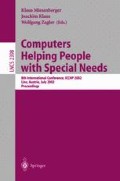Abstract
Training with Multimodal lifelike agent interfaces is a promising new style of training especially fore children with disabilities. In this paper, we present the evaluation results of our training agent system called TAPA (Training with Animated Pedagogical Agents), which has a realistic moving body and body language features. TAPA is web based, it can be accessed via a Web Browser. TAPA allows children to access the training sources over the Internet through a user-friendly multimodal interface similar to natural human communication.
Access this chapter
Tax calculation will be finalised at checkout
Purchases are for personal use only
Preview
Unable to display preview. Download preview PDF.
References
Aldenkamp A, Alpherts W, Dekker M and Overweg J (1990) Neuropsychological aspects of learning disabilities in epilepsy. Epilepsia 31(4): pp 9–20
Dam M (1990) Children with Epilepsy: The effect oft seizures, syndromes, and etiological factors on cognitive functioning. Epilepsia, 31(4): pp 26–29
Hasselhorn M & Mähler C (1992) Kategorisierungstraining bei Grund-und Sonderschülern (L): Zur Rolle meta-memorialer Instruktionselemente. Psychologie in Erziehung und Unterricht, 39: pp 179–189
Haverkamp F, Tebarth H, Mayer H & Noeker M (1999) Serielle und simultane Informationsverarbeitung bei Kindern mit symptomatischer und idiopathischer Epilepsie: Konsequenzen für eine spezifische pädagogische Förderung. Aktuelle Neuropädiatrie′98: pp 251–255
Johnson WL & Rickel J (2000) Animated Pedagogical Agents: Face-to-Face Interaction in Interactive Learning Environments. Marina del Rey (California/USA): University of Southern California, Center for Advanced Research in Technology for Education (CARTE)
McCrae RR, John OP (1992) An Introduction to the five-factor-model and its applications. Special Issue. The five-factor-model: Issues and applications. Journal of Personality 60: pp175 215
Microsoft Agent Software Development Kit (1999) USA, Redmond Washington, Microsoft Press
Mohamad Y, Tebarth H (2001) Evaluation in the Development of a tele-medical Training System. Universal Access in HCI: Towards an Information Society for All. Volume 3 of the Procedding of HCI International 2001, August 5–10. USA, Louisiana, New Orleans: Lawrence Erlbaum Associates: pp 836–839
Ortony A, Clore GL, Colins A (1988). The Cognitive Structure of Emotions. Cambridge: Cambridge University Press.
Perleth C (1992) Strategienutzung, Metagedächtnis und intellektuelle Begabung (Dissertation). LMU, München
Perleth C, Schuker G & Hubel S (1992) Metagedächtnis und Strategienutzung bei Schülern mit Lernbehinderung: eine Interventionsstudie. Sonderpädagogik, 22(1): pp 20–35
Pieper M (2000) Sociological Issues of HCI Design, In: Stephanidis C (ed.) User Interfaces for All — Concepts, Methods, Tools. Lawrence Erlbaum, Mahwah (NJ)
Schneider W (1989) Zur Entwicklung des Meta-Gedächnisses bei Kindern. Hans Huber Verlag, Bern
Tebarth H, Mohamad Y & Pieper M (2000) Cognitive Training by Animated Pedagogical Agents (TAPA) Development of a Tele-Medical System for Memory Improvement in Children with Epilepsy. 6th ERCIM Work shop User Interfaces for All; CNR-IROE, Florence, Italy 25–26 October 2000
Tsuchiya T, Yamauchi T, Yokoi K, Yamada Y, Braham RL, Kurosu K (1991) Psychological studies of emotional changes in children undergoing dental treatment. 1. Changes in plethysmogram. Aichi Gakuin Dent Sci (4): pp15–34
Author information
Authors and Affiliations
Editor information
Editors and Affiliations
Rights and permissions
Copyright information
© 2002 Springer-Verlag Berlin Heidelberg
About this paper
Cite this paper
Mohamad, Y., Hammer, S., Haverkamp, F., Nöker, M., Tebarth, H. (2002). Evaluational Study: Training with Animated Pedagogical Agents. In: Miesenberger, K., Klaus, J., Zagler, W. (eds) Computers Helping People with Special Needs. ICCHP 2002. Lecture Notes in Computer Science, vol 2398. Springer, Berlin, Heidelberg. https://doi.org/10.1007/3-540-45491-8_21
Download citation
DOI: https://doi.org/10.1007/3-540-45491-8_21
Published:
Publisher Name: Springer, Berlin, Heidelberg
Print ISBN: 978-3-540-43904-2
Online ISBN: 978-3-540-45491-5
eBook Packages: Springer Book Archive

